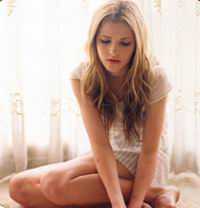Yes, she’s a teenager. True, she’s a singer-songwriter with anthems of rebellion to spare. Still, never, ever compare Katy Rose to fellow female singer songwriters. “I want to be my own person. I hope people take what I do as my own, and don’t label me."
One label that does stick to her, however, might be provocative." Indeed, Rose, on her debut album, "Because I Can", takes listeners on a cathartic emotional journey right up to the edge that has more to do with the likes of early Liz Phair or PJ Harvey than her adolescent peers in the top 40. It’s an urgent missive from a teenage wasteland that’s all her own. "I’m such an open book," the sixteen-year-old explains. "I’ll tell you the honest truth about anything in my life—I just don’t want to scare anyone."
In fact, it would be hard to find such a truthful, poetic peek into the mind of a young woman who’s seen more of life than maybe anyone needs to. "I got serious about songwriting when I was 13," Rose says. "It was a shitty-ass year. There was a lot of self-destructive behavior: I was having problems at home, I was having problems at school, problems with myself, being in my own skin. I fucking hated myself and didn’t know why. My mom was so depressed when I was young, my dad was away touring; I felt abandoned, so I grew up really fast. I started writing music as an outlet that wasn’t self-destructive."
On Because I Can, Rose transforms those experiences into haunting songs that become so much more than confessionals, thanks to her wise-beyond-her-years command of imagery and metaphor. Certain symbols—the poisonous flower oleander, roses whose growth and decay smell of autobiography—recur throughout, but none more than Rose’s hometown of Los Angeles. For Rose, L.A. is a sundazed never, never land where kids act like grownups, grownups act like kids, and nobody gets out of the myth factory without paying a price. On the brooding "Snowflakes" she calls it "Shangri-L.A.," while on "Overdrive" she portrays a place where "they all come here to find a scene/But end up girls on methedrine/Naked on a TV screen."
L.A.’s fast life was always close at hand for Rose. She grew up in Tarzana, California, in the very house that old-time TV show Mr. Ed (famous for its talking horse protagonist) was filmed. But the domestic quaintness of ‘50s television had nothing to do with Rose’s bohemian family life. She was born to a singer mother (a background singer for many 70’s icons) and musician father Kim Bullard, who was often away as a tour keyboardist for Crosby, Stills, and Nash and Art Garfunkel and as a member of the band Poco. Rose in fact seems fated for precocity—she was born on the same day as Mozart, and recognizes the parallels—but LA’s atmosphere sped up that evolution even more. "When you grow up in L.A. like I did, you grow up fast," Rose says. "Celebrities and media were around everywhere—my friends and I were little adults at five." Not surprising considering her old soul, most of Rose’s musical influences—Edith Piaf, Led Zeppelin, Nick Drake, Nico, Janis Joplin, Joni Mitchell—were at their heights well before she was born, and even the contemporary artists she favors, like the White Stripes and Fiona Apple, tend towards icono-classicists.
The depth and breadth of Because I Can in fact follows in the ambitious footprints of her musical heroes. Produced by dad Bullard in a home studio housed in the very barn that was Mr. Ed’s home, Because I Can proves a surprising musical tapestry. The album percolates with confrontational guitars, stunning psychedelia, eerie electronica, and lush symphonics, often in the same song, the stunning diversity of the music providing a vital contrast to the lyrics’ gritty poetics. It’s a world where "Overdrive”’s indelible hooks co-exist alongside spine-tingling balladry like "Teaching Myself To Dream", the Joni-esque "Original Skin" and the garage-rock riffs powering rockers like "Catch My Fall" and "Vacation." All of it is united by Rose’s voice, which frequently takes on multiple personalities, from youthful exuberance and angry screams to defiant whispers and the smoky, jazzy tones of someone who’s seen too much.
Like a matador’s red flag, the evocative music and production draws the listener to Rose’s lyrics, from which there’s no turning back. Lines like "When you say you’ll always be there, it paints such a lovely picture/But no matter how you frame it it’s still pornography," "I see this girl with so much anger/Pacified by holding strangers/Making peace with all her danger by looking in the mirror" (from "Glow"), "I want you to understand how I could be confused right after being used" (from "I Like"), and "I need to take a shower when I look at you/You sting and hurt like a bad tattoo" reverberate in both their clever wordplay and biting universal truths. But Rose also has a sense of humor, like on "Vacation"’s playful evisceration of her Catholic school experience ("I’ve lost all sense of navigation, but got my Californication/If I miss my graduation/I’ll have one fucking long vacation"). "My themes are disassociation, hard times, searching, idealism, and heartbreak," Rose says. "But there’s a lot of hope in there—that’s what keeps me going. The first line of ‘I Like’ us ‘I wanna live before I die’—that’s my philosophy. Life is a rollercoaster, and I’m not stopping. But where I used to feel like a twig, waving in the wind, now I feel more like a strong tree."
